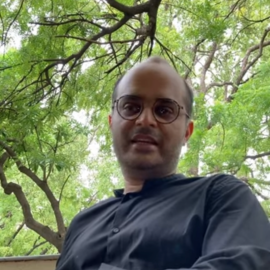Developing Literary History: The Distant Reading of Poetry under European Colonialism.

Septembre 2022 à juin 2023
Shad Naved was born in Aligarh (India), and studied at the universities of Delhi, Oxford, California and the English and Foreign Languages University, Hyderabad. He researches classical Urdu and Arabic poetry, and specializes in the literary history of queerness in the connected literary cultures of West Asia and South Asia. He also translates between English, Hindi, Urdu, Arabic, Persian, Spanish, and French. Currently he teaches comparative literature and translation studies at Dr B.R. Ambedkar University, Delhi. He was previously a research fellow at the Centre for Contemporary Studies, Nehru Memorial Museum and Library, New Delhi, where he studied the emergence of a feminist public sphere around lyric practices in Urdu in contemporary India and Pakistan. His first book project, «Urdu Eros: Lyric Queerness and the Politics of Vernacularity», is nearing completion. His recent publications include a study of García Márquez in South Asian languages, the theory of Dalit autobiography, and an English translation of a Hindi study about the making of the modern Hindi canon.
Developing Literary History: The Distant Reading of Poetry under European Colonialism.
The project studies three influential European Orientalist histories (by Garcin de Tassy (Urdu-Hindi), E.G. Browne (Persian) and E.J.W. Gibb (Turkish)) of Eastern literatures from the late colonial period. Concerned centrally with the lyric mode (ghazal), these histories characterize the essence of non-western literature in terms of statism, racism and absolutism. How did this founding act of reading the eastern lyric shape literary relations in the twentieth and twenty-first centuries? The project will argue that the recent proposal of distant reading (Moretti et al.) in world literature discussions ignores the critique of figures of colonial literary history that still characterize the reading of literatures of the « periphery », both within the periphery and outside it.